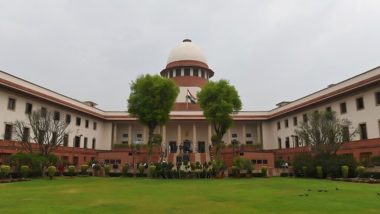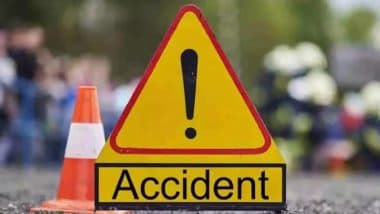New Delhi, April 9: The Supreme Court on Wednesday rapped the Centre over the delay in formulating a cashless medical treatment scheme for motor accident victims and summoned the secretary of the Ministry of Road Transport for an explanation. A bench of Justices Abhay S Oka and Ujjal Bhuyan took objection that despite its January 8 order, the Centre did not comply with it.
"The time granted has expired on March 15, 2025. This is a serious breach and violation of not only orders of this court but a violation of implementing a very beneficial legislation. We direct the secretary, ministry of road transport and highways to appear on video-conferencing and explain why the directions of this court were not complied with," the bench said. SC on Bangladeshi Immigrants: Supreme Court Raps Centre, Demands Explanation ‘Behind Keeping Bangladeshi Settlers in Detention Camps for Indefinite Period’.
Only when top government officers are summoned here they take the orders of the court seriously, it added. Additional solicitor general Vikramjeet Banerjee, appearing for the Centre, said there were "bottle necks".
The bench, however, remarked,"This is your own legislation, people are loosing lives, because there is no facility for cashless treatment. This is for the benefit of common people. We are putting you to notice, we'll take action under contempt. Ask your secretary to come and explain." The official was directed by the top court to appear on April 28 for the explanation. Delhi Air Pollution: Supreme Court Raps Commission for Air Quality Management Over Stubble Burning, Says ‘It Is All in the Air’.
The bench also directed the secretary of transport department to issue instructions in writing to all district magistrates to upload the claims of hidden hit-and-run cases on the General Insurance Council (GIC) portal. On January 8, the top court directed the Centre to formulate the scheme for the cashless medical treatment of motor accident victims in the "golden hour" period mandated under the law.
It had referred to Section 162(2) of the Motor Vehicles Act, 1988, and ordered the government to provide by March 14 the scheme which could save numerous lives with prompt medical care to accident victims. The golden hour, defined under Section 2 (12-A) of the Act, refers to a one-hour window following a traumatic injury under which a timely medical intervention will most likely prevent death.
The court had underscored the importance of providing immediate medical care during the critical period and said delays caused by financial concerns or procedural hurdles often cost lives. It had underlined the statutory obligation on the Centre to frame a scheme under Section 162 for cashless treatment and said the provision sought to uphold and protect the right to life guaranteed by Article 21 of the Constitution.
The law therefore provides the insurance companies carrying on general insurance business in India to provide for the treatment of road accident victims, including during golden hour in accordance with the scheme made under the MV Act, it said. It was noted despite the provision being in force since April 1, 2022, the government was yet to implement the scheme, prompting the court's intervention.
The Centre had submitted a draft concept note outlining a proposed scheme, which included a maximum treatment cost of Rs 1.5 lakh and coverage for only seven days. However, these limitations were criticised by counsel representing the petitioner, who argued they fell short of addressing the need for comprehensive care.
The GIC was tasked with administering hit-and-run compensation claims and developing a portal to streamline the process, it said. The portal would enable the upload of required documents, inform states of deficiencies, and reduce delays in processing claims.
The order had said 921 claims under the hit-and-run compensation scheme remained pending as of July 31, 2024, due to document deficiencies, and asked the GIC to coordinate with claimants and address the issue. The GIC was further instructed to expedite the development of the portal and report compliance by March 14, 2025.













 Quickly
Quickly




















